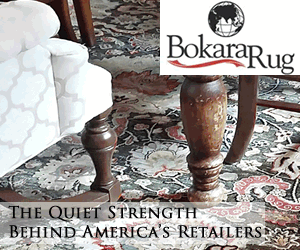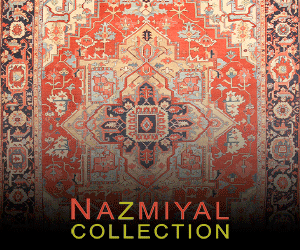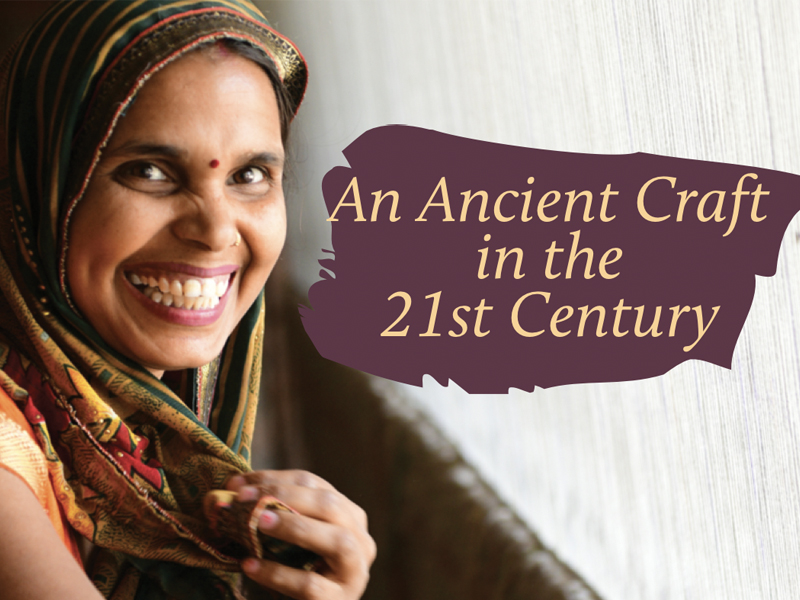“We already have close relations with our factories,” observes Daisy Barquist of Tamarian, “but we are NOT in Nepal 24/7!” She and her colleagues want to stay up-to-date about conditions in each of their locations, to make sure all the weavers have what they need and are treated safely and fairly. Now, “There’s something very reassuring knowing that they are being monitored frequently.”
That monitoring is provided by LabelSTEP, an international non-profit organization. Creating hand-woven rugs is an ancient, admirable craft—yet a demanding occupation for many weavers. That’s why, for nearly 30 years, STEP has been strengthening working conditions and quality of life for carpet weavers. A major goal is enabling workers to develop pride and confidence through improvements in both their artisanal skills and lifestyles.
The foundation of STEP’s activity is partnering with wholesalers, importers, retailers and designers in the rug industry. These partnerships fund STEP’s diverse projects across Nepal, India, Afghanistan, Morocco, Iran, Turkey and Pakistan, emphasizing Fair Trade initiatives and protections. Weavers in these rug pro- ducing countries are empowered through educational programs covering topics like health, safety, and financial literacy. What they learn improves their lives, preserves centuries-old artisanal skills, and builds a sustainable future for the handmade carpet industry. STEP’s work benefits weavers’ families and communities, too.
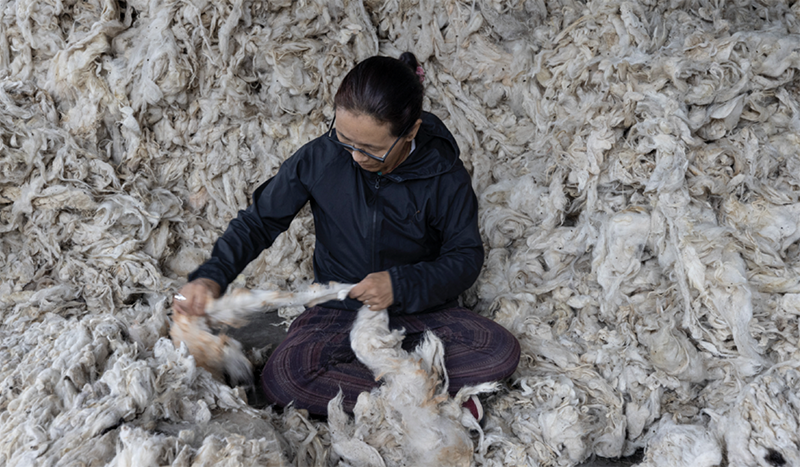
Image from the new book “Beyond the Loom: The People who Crafted Rugs in Kathmandu,” authored by award-winning photographer Narendra Shrestha and Tamarian owner Ryan Higgins.
THE INTER-RELATIONSHIPS
In each rug-producing country, STEP selects “auditors” who are familiar with the local culture and trained to make careful assessments during frequent, unannounced visits to factories.
“What I love most about my job is the craftsmanship, which goes back thousands of years,” reflects Jennifer Samad, marketing manager at Samad. She’s made several trips to visit their factories, often small family businesses like hers. “We have a nice relationship with them—and even know their children! However, being so far abroad, we can’t know every aspect of their work. For a long time, we looked for a third party to help audit our manufacturers, so we can hold them accountable, see where the gaps are, and what we can improve.”
Samad selected STEP because, “They cover so many aspects of the manufacturing process, including whether the facility is safe, and if artisans are being paid a fair wage. STEP’s team on the ground understands the culture so well. Their auditors prepare full reports, showing where we need to improve. Then we make the improvements, sharing the news with our customers, so they can share it with theirs. We value the transparency.”
Tamarian became a certified STEP partner in 2021. Recently, Nepal set its minimum wage fairly high, reports Barquist. "In some cases, we’re meeting that minimum. In others, we’re trying to catch up from a lower rate. Nepal’s government raised the minimum age to work in a factory from 16 to 18, because of social concerns that are associated with the age when someone is considered an adult.” STEP auditors are, “Culturally prepared to observe if a factory has some 16-year-olds, which was fine two years ago but isn’t now. If local laws become more stringent, we need to meet them.”
“Partnering [with LabelSTEP] was a very natural move because of their initiatives to empower the communities— not only to prevent child labor but also to create great educational programs for the weavers and families. “ GEORGIA PAHL, WOOL & SILK RUGS
In some communities, the tradition is still women weaving at home, she discovered on trips to various countries, before working in the rug industry. “When STEP’s people from the same culture do the evaluation, they understand that cultural context.” STEP auditors made over 150 visits to Tamarian’s sites in one year, notes Barquist. “That’s significant. It’s almost like having eyes and ears there!”
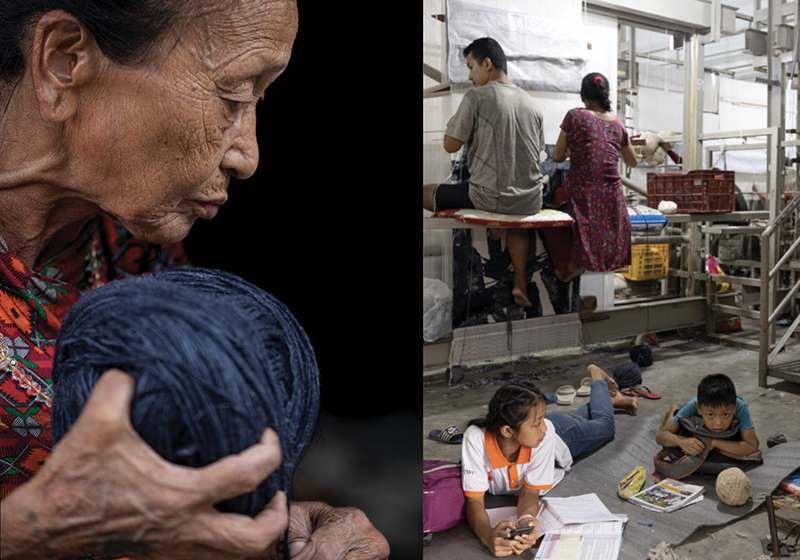
Images above and opposite are from Tamarian’s new book “Beyond the Loom.” The book documents how the company makes its rugs and focuses on the human interaction of the masters. Photos by Narendra Shrestha.
Wool & Silk Rugs partnered with STEP in 2016. Owner Erbil Tezcan was visiting Nepal six times a year at that time. “We’re very involved with the mill we work with there, its workers, and their families,” says marketing director Georgia Pahl. “In the past, we’ve bought the kids shoes, and helped provide better quality of life for the families, by making sure the needs are met. On our own, we sponsor ten children each month. We always try to do whatever we can to help. We believe the weavers are true artisans, and want to make sure they’re not taken advantage of.”
At Wool & Silk, “Our values really aligned with STEP. Partnering was a very natural move because of their initiatives to empower the communities—not only to prevent child labor but also to create great educational programs for the weavers and families. That’s how you uplift communities: through education,” Pahl stresses.
THE PROGRAMS
STEP aims to maintain an ongoing, full-time handmade carpet industry, built upon Fair Trade, with the highest international labor standards. They work to prohibit child labor, develop environmentally conscious production, and promote sustainable development for the industry.
Samad especially appreciates the specific concerns that STEP’s auditors assess. “They go in to make sure everything is up to par, such as health and safety protection of workers. Is there enough natural or artificial light, and adequate restroom facilities on site?” Auditors confirm that artisans are paid a fair wage for their country, and that there is no child labor.
“We want to make sure things are ecologically sound, and learn how we can improve those areas,” says Samad, who understands that possibilities may be limited in a small village. “Improving our environmental effects is important to us, so we added that concern. Based on an auditor’s report, we can go to our manufacturer and say, for instance, ‘You need more light in this room.’ STEP’s local people do follow-up, checking with our factory that changes are made, which is wonderful.”
Pahl values STEP projects that improve the water system, and educate on topics from workers’ rights to health and hygiene, including vital concerns like breast cancer detection. “These different modules are adjusted to the needs of each group of individuals. Many of them have no access to this kind of information!
“It’s not an easy job to be a weaver. You’re sitting there for eight hours,” she reflects. “The problem of generations continuing is happening all over the world; weavers in China sought better opportunities in other industries. In Nepal, a very poor country, we partner with STEP to benefit weavers and workers, so they can have the best life possible. Lots of workers are women, including young mothers with adorable kids. It’s wonderful that they can bring their children to work, where they happily go outside and play. Those kids exposed to rugs early on may go into the industry!”
With its trade partners, “STEP brings in doctors or medical professionals, and helps create disability-free workplaces where someone who can’t walk can weave,” exclaims Barquist. “They teach people financial literacy, and how to save money. They’re creating awareness so that someone who had never banked understands a system where they can create a bank account! We can really support these weavers by, for example, helping them avoid unnecessary debt.”
Barquist considers STEP “a bridge, helping to bring goodwill to this industry. We need to be very sensitive to keeping the carpet industry robust. To continue these beautiful rugs, we have to train upcoming weavers, and pay today’s weavers well so they don’t go elsewhere to earn more money.”

Wool & Silk sponsors ten children from its facilities each month. They help provide better quality of life for the families by making sure their needs are met. Image courtesy of Wool & Silk Rugs.
THE RESULTS
Weavers are benefitting from some of the programs. For instance, Laxmi, who works at a factory in Kathmandu, Nepal, said, “Weaving has helped me become financially independent for the first time in my life. This is a skill, and I feel privileged for the opportunity to have learned it. If my children wished to learn weaving, I would encourage them to do so.”
“For a long time, we looked for a third party to help audit our manufacturers. [STEP] covers so many aspects of the manufacturing process, including whether the facility is safe, and if artisans are being paid a fair wage.“ JENNNIFER SAMAD, SAMAD
Ramesh, also working in Kathmandu, said, “Before learning to weave, me and my other friends with hearing impairments have never had a job. I’m very happy about the opportunity. I never thought I would be working indoors, together with my friends, doing artistic weaving and earning a living for myself.”
“STEP provides its partners and their brands with greater visibility, increased name recognition, and a stronger positive image among customers and in the media,” says its director Reto Aschwanden. “STEP strengthens the relationship between trade and production and, through good working conditions and satisfied workers, yields higher product quality and meets growing customer demand.”
“It’s had a positive effect on our company image, for sure,” Samad finds. “We have so many ideas about what we hope to do, and we’re excited that we’ll soon share our involvement with STEP on our website. At trade shows, we talk to people about it so they can ask questions.”
Tamarian hopes that describing their partnership with STEP in their news-letters, “will give retailers information that they can put into their own newsletters. Some will, depending on what’s important to them and to their customers,” says Barquist. She’s noticed that designers are starting to be more concerned. “We’re beginning to offer ASID credit for designers to learn about Fair Trade, safety, and environmental concerns including PFAS.” Tamarian uses only natural fibers, but rugs can contain materials that are toxic.
In 2023, Tamarian invited clients to their warehouse for an event featuring their newest rugs and an educational segment. “Reto [Aschwanden] came to share what we’re doing, what LabeSTEP is all about,” recalls Barquist. Tamarian displays the LabelSTEP image on their rug tags.
This year, Tamarian published a book, “Beyond the Loom: The People who Crafted Rugs in Kathmandu,” by owner Ryan Higgins and award-winning photographer Narendra Shrestha. “Ryan wanted to document how we make our rugs and show what’s really happening, with images that focus on the human interaction of the masters.”
“I saw children in our factories, on the floor reading or doing homework. That says to me that the air is clean, the light is good, the environment is safe.“ DAISY BARQUIST, TAMARIAN
In the photos, Barquist confides, “I saw children in our factories, on the floor reading or doing homework. That says to me that the air is clean, the light is good, the environment is safe. If moms are still breastfeeding, they can do that and go back to work. We want to make sure that we’re doing good, within the cultural norm.”
“Beyond The Loom” can have varied audiences. “As the weavers see their images in the book, I hope they will feel appreciated and know that what they are doing is meaningful and beautiful,” says Higgins. “Images speak louder than words, and I want people who buy the rugs to see the life energy in the rug.”
Pahl sees consumer interest growing among Millennials. “We only want to consume products made with fair trade compliance. Awareness of where a product comes from is very much part of my generation’s conversation.” Wool & Silk didn't partner with STEP just to sell rugs, she explains, “but because it’s what we believe in, so we’ve never advertised it. Now, I think a reason to display it a little more is because others will feel good about contributing to initiatives that protect the artisans making their product." They mention their STEP partnership on social media.
“I think all of us who work in the rug business,” says Pahl, “have an opportunity to assist people who may not have the resources we take for granted—it’s a blessing that we’re in a position to offer assistance wherever possible.”
Samad concurs. “It’s a very positive experience for our artisans, our manufacturers, and for us. I feel like everyone is getting something out of this relationship!”


